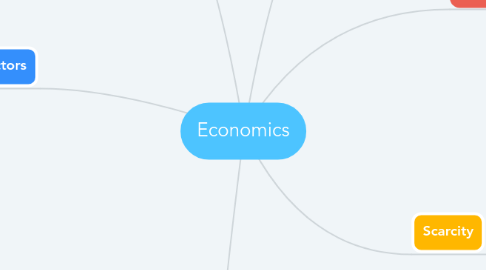
1. Economic systems
1.1. Subsistence economies
1.1.1. Where traditions determine economic decision making
1.1.2. Primitive
1.1.2.1. Absence of money and markets
1.1.2.2. Low level of technology or skills
1.2. (Capitalist) Market economies
1.2.1. State-run enterprises focus on the production of capital goods
1.2.2. Market-driven sector caters for consumers
1.3. Socialist/command economies
1.3.1. The state plays a major role in the operation of the economy
1.3.2. Modern
1.4. Mixed economies
1.4.1. Exhibit features of more than one of these systems
1.4.2. Most economies operate under this title
2. Sectors
2.1. Household
2.1.1. Individuals in the economy
2.1.2. Earn income
2.2. Business
2.2.1. Distribute goods and services to consumers
2.2.2. Buy resources from households
2.2.3. Pay income to households
2.3. Finance
2.3.1. Borrow and lend money to businesses and households
2.4. Government
2.4.1. Raise revenue through taxes, rates, fees and charges
2.4.2. Use revenue to provide collective goods and services
2.5. Overseas
2.5.1. Exporters and importers of goods and services
3. Policies
3.1. Demand side
3.1.1. Momentary policy
3.1.1.1. Impacts the economy through the supply and cost of money
3.1.2. Fiscal policy
3.1.2.1. Government use of budget deficits or surpluses (taxation and spending)
3.1.3. External policy
3.1.3.1. Influences the levels of exports and imports
3.2. Supply side
3.2.1. Supply side policy
3.2.1.1. Increase aggregate supply through encouraging business growth
4. Scarcity
4.1. Unlimited wants but limited resources
4.1.1. Businesses make choices based on what consumers want
4.1.2. Individuals choose how best to use their resources
4.1.3. Governments make choices to best meet the needs of the population
4.2. Questions asked to help solve scarcity
4.2.1. 1. What and how many good and services are to be produced?
4.2.2. 2. How are those goods and services to be produced?
4.2.3. 3. Who will receive and consume those goods and services?
5. Types of wants
5.1. Recurrent wants
5.1.1. Food, utilities
5.2. Complementary wants
5.2.1. Fish and fish tank
5.3. Competitive wants
5.3.1. Apple v Samsung
5.4. Individual wants
5.5. Collective wants
5.5.1. Access to healthcare, new roads
5.6. Luxury wants
5.6.1. Expensive cars
5.7. Basic wants/need
5.7.1. Food, shelter, water
6. Government spending
6.1. Surplus
6.1.1. If government spending is less than taxation
6.2. Deficit
6.2.1. If government spending is greater than taxation

